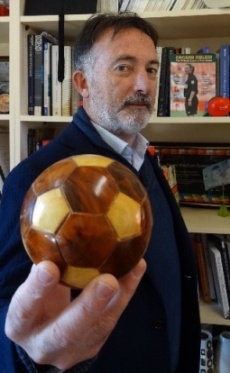 A
Charles Sturt University (CSU) academic has welcomed the resignation yesterday
of the President of Fédération Internationale de Football Association (FIFA), and
says reform of the organisation is necessary and overdue.
A
Charles Sturt University (CSU) academic has welcomed the resignation yesterday
of the President of Fédération Internationale de Football Association (FIFA), and
says reform of the organisation is necessary and overdue.
Associate Professor Peter Simmons, who is an Associate Head of the CSU School of Communication and Creative Industries in Bathurst, has conducted FIFA-funded research and has been active in local grade football (soccer) as a player and coach.
"The surprise resignation by Mr Sepp Blatter after 17 years as president of FIFA, while not an admission of guilt, was nevertheless required for true accountability and transparency of the organisation," Professor Simmons said.
"The damage to FIFA by the sustained perceptions of senior-level corruption has become intolerable to grassroots players and fans alike. The alleged corruption that has taken place under his stewardship of the organisation has been on a monumental scale and led to the FBI raids and charges against FIFA officials in the US last week.
"Mr Blatter has failed to establish processes that at least give people confidence that senior officials take the allegations seriously. FIFA needs regulations, investigations, and enforcement, not just words and stunts."
Professor Simmons said it must be remembered that FIFA is huge organisation, and more powerful than some national governments.
"Like it or not, soccer, as the most played sport world-wide, is a large part of life on earth," he said. "FIFA has great economic power due to the revenue it accrues from a range of competitions and the associated television and other media rights. At one level amounts seem preposterous and laughable, but when you hear the exorbitant figures that are bid and paid to secure the World Cup and its related rights, you realise it is no laughing matter.
"We have become accustomed to responsible leaders - such as former NSW Premier Mr Barry O'Farrell - falling on their swords long before Mr Blatter has."
While charges are yet to be laid against Mr Blatter by any legal authority, Professor Simmons said there is disbelief at the grassroots level that he isn't implicated, and a strong belief that he hasn't done enough to stop or minimise the alleged corruption in FIFA.
"In many ways I'm pleased for the more than half a million people who play football in Australia," Professor Simmons said. "People love the sport but hate FIFA. FIFA is every footballers' peak body, but who wants to be part of a rotten organisation?
"Leaders set the tone of organisations, and when members perceive corruption it spreads. They become cynical, about the parent organisation and those in authority at lower levels begin making decisions without reference to written policy or proper process.
"Apart from the concerns and allegations about the awarding of rights to Russia to host the World Cup in 2018, and more particularly to Qatar for the World Cup in 2022, people are increasingly concerned and disillusioned with the treatment of so-called 'guest' workers in Qatar who are constructing the event facilities.
"The reports of migrant workers from Bangladesh, India, Pakistan, Nepal and Sri Lanka dying and enslaved, and of Nepalese workers unable to return home to support the victims of the recent earthquakes there, need to be thoroughly and independently examined and acted on."
Professor Simmons says FIFA exercises great power on matters of revenue but seems ineffective on many issues of principle, and there are many other related questions that need to be addressed. "Where are the sponsoring corporations, and the media, in all this?" he asks. "What is their attitude and position? How long can major corporate sponsors, such as VISA, have their names linked so strongly with an organisation so tainted by perceptions of corruption? It's time that FIFA is dramatically reformed and that's something all football federations should support," Professor Simmons said.





Social
Explore the world of social